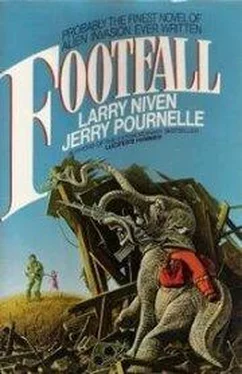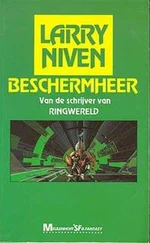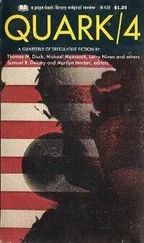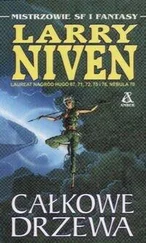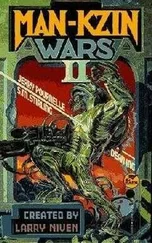Better to think of her as mistress and secretary. Emotional involvement was dangerous.
She came in and closed the door. “Who is this man?” she demanded. “Why is Moscow sending an important man who does not give his name? What have you been doing Pavel Aleksandrovich?”
He frowned slightly. Lately she had begun speaking to him that way even at the office. Never when anyone was around, of course, but it was bad for discipline to allow her to address him in that way inside the Institute. A rebuke came to his tongue, but he swallowed it. She would accept it, yes, but he would be made to pay, tonight, tomorrow night, some evening in her apartment…
“It is not a difficulty,” Bondarev said. “He was expected.”
“Then you know him—”
“No. I meant that someone from Moscow was expected.” He smiled, and she moved closer to him until she was standing beside his chair. Her hand lay on his arm. He covered it with his own. “There is no difficulty, my lovely one. Calm yourself.”
“If you say so—”
“I do. You recall the telephone call from the Americans in Hawaii? It concerns that.”
“But you will not tell me—”
He laughed. “I have not told my wife and children.”
She snorted.
“Well, yes. Even so, this is a state secret. It is a matter of state security! Why should I deceive you?”
“What have we to do with state security? How can the state be affected by distant galaxies?” she demanded. “What have you been doing? Pave I, you must not do this!”
“But what—”
“You wish to go to Moscow!” she said. “It is your wife. She has never been happy here.” Her voice changed, became more shrill, accented with the bored sophistication of a Muscovite great lady, daughter of a member of the Politburo. “Yes, the Party found it necessary to send Pavel here for a few years. The provincial people are so inefficient. I suppose we simply must make the sacrifice.”
“I wish you would not mock Marina,” he said. “And you are wrong. This has nothing to do with a return to Moscow. Resides, when we do go back, I will take you with me. All Russians want to live in Moscow.”
“I do not want to go. I want to stay here, with you. Your wife is not so careful here. In Moscow she would be concerned, lest her friends learn her husband has a mistress.”
That was true enough, but it hardly mattered. “None of this is important.” he said. “Not now. Things will change soon. Sooner than you know. Great changes, for all of us.”
She frowned. “You are serious.”
“I have never been more serious.”
“Changes for the better?”
“I do not know.” He stood and took both her hands in his. “But I promise you there will be changes beyond our power to predict, as profound as the Revolution.”
Pavel Bondarev studied the papers he had been given, but from time to time he looked past them at the man who had brought them. Dmitii Parfenovich Grushin, a Lieutenant Colonel in the KGB despite his seeming youth. Grushin wore a suit of soft wool that fit perfectly, obviously made in Paris or London. He was of average height, and slender, but his grip had been very strong, and he walked with an athletic spring to his step.
The papers told him what General Narovchatov had already said. “I see,” Bondarev said. “I am to go to Baikonur.”
“Yes, Comrade Academician.” Grushin spoke respectfully. It was difficult to know what the man was thinking. He seemed perfectly in control of his face and his voice.
He brought a letter from General Narovchatov, inviting Marina and the children to Moscow, and enclosing the necessary travel permits. Marina would be pleased. “There is much unsaid here,” Bondarev said.
“Yes. I can explain,” Grushin said.
“Please.”
“General Narovchatov has become First Secretary of the Party.” Grushin said carefully. He paused long enough to allow the full weight of that to wash across Bondarev. “This will be announced within the week. The Politburo finds this alien ship a matter of some concern. Many of the marshals of the Soviet Union do not believe in aliens.”
“Then they think—”
“That this is a CIA trick,” Grushin said. “It cannot be.”
“I believe that. So does Chairman Petrovslciy.”
“And Comrade Trusov?”
Grushin shrugged. “You will understand that I do not often see the Chairman of the KGB however, I am informed that the vote of the Defense Council was unanimous, that a civilian scientist should command the preparations for receiving the aliens. You, Comrade.”
“So I was told. I confess I am not especially qualified.”
“Who is? I am trained as a diplomat. Yet what training is there, to meet with aliens from another star? But we must do what we must do.”
“Then you have been assigned as my deputy?” That would be common enough practice, to have a KGB officer as chief of staff to a project of this importance. Certainly the KGB would insist on having its agents high within the control organization.
“No, another will do that,” Grushin said. “My orders are to proceed to Kosmograd.”
“Ah. You are a qualified astronaut?”
“No, but I have been a pilot.” Grushin’s smile was thin. “Comrade Academician, I have been ordered by your father-in-law to trust you, to tell you everything I can. This is unusual. Stranger yet, Comrade Trusov himself instructed me to do the same.”
Strange indeed. So. The Politburo did take this alien craft seriously. Very seriously. And General Nikolai Narovchatov had said, “You will trust the man sent by KGB. As much as you trust any man from KGB.” What that could mean was not obvious.
“So,” Bondarev said. “What is there that I must know?”
“The military,” Grushin said. “Not all will cooperate, and not all will be under your command. You will need great skills at Baikonur to learn which marshals trust you and which do not. I need not tell you that this will not be easy.”
“No.” It was safe enough to say that much. Not more.
“It is also vital that the Americans do not learn the extent of our mobilization.”
“I see.” I see a great deal. Some of the marshals are out of control. They mobilize their forces regardless of the wishes of the Kremlin. The Americans can never be allowed to know this! “What else must I know?”
“The crew aboard Kosmograd,” Grushin said. “Who is there now, and whom we shall invite.”
“Invite—”
“Americans. They have already requested that we allow their people aboard Kosmograd when the alien ship arrives. The Politburo wishes your advice within three days.” He paused. “I think, though, that they will invite the Americans no matter what you say.”
“Ah. And if the Americans wish this, other nations will also.” He shrugged. “I do not know how many Kosmograd can accommodate.”
“Nor I, but I will tell you when I arrive there. As I will advise you of the personnel aboard. Of course you will also receive reports from Commander Rogachev.”
“A good man, Rogachev,” Bondarev said.
Grushin’s smile was crafty, like a peasant’s, although there was little of the peasant about the KGB man. “Certainly he has a legend about him. But he is not everywhere regarded as you regard him.”
“Why?”
“He is a troublemaker when he feels his mission is in danger. A fanatic about carrying out orders. Make no mistake, technically he is the best commander we have for Kosmograd.”
“But you doubt-doubt what? Surely not his loyalty?”
“Not his loyalty to the Soviet Union.”
“Ah.” There had been an edge to Grushin’s voice. Rogachev had not always shown proper deference to the Party. In what way is he a trouble-maker?”
Читать дальше
